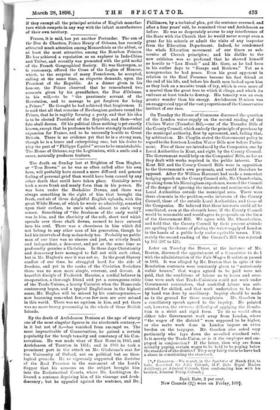On Tuesday the House of Commons discussed the question of
the London water-supply on the second reading of the Chelsea Water (Transfer) Bill,—one of the Transfer Bills of the County Council, which embody the principle of purchase by the municipal authority, first by agreement, and, failing that, by arbitration. Mr. Chaplin stated the Government policy in regard to the fourteen London Water Bills now before Parlia- ment. Five of these are introduced by the Companies, one by Local Authorities in Kent, and eight by the County Council. The Government would help on the Companies' Bills, so far as they dealt with works required in the publics interest. The Kent Bill and the County Council Bills were in opposition to the Government's own proposals, and would therefore be opposed. After Sir William Harcourt had made a somewhat hedging speech on the County Council side, Mr. Chamberlain, speaking from his Birmingham experience, warned the Council of the danger of ignoring the interests and sentiments of the Local Authorities outside the municipal area. There were three elements in the problem,—the interests of the County Council, those of the outside Local Authorities, and those of the Companies. He believed that these interests could all be conciliated, even at the eleventh hour, if the County Council would be reasonable and would agree to proposals on the lines of the Government Bill. We agree with Mr. Chamberlain, and hold that the County Council by their present attitude are spoiling the chance of placing the water-supply of London in the hands of a public body under equitable terms. Ulti- mately the second reading of the Council's Bill was rejected by 162 (287 to 125).






































 Previous page
Previous page